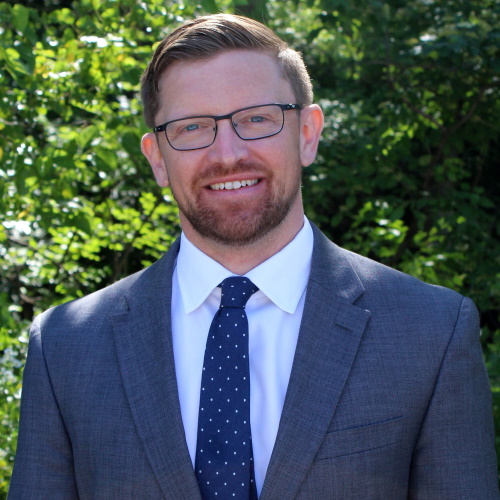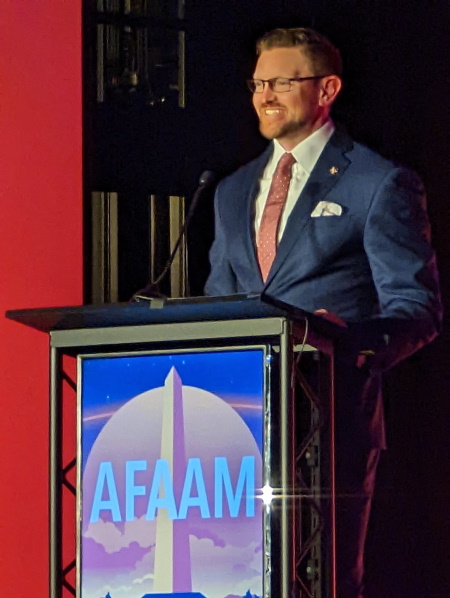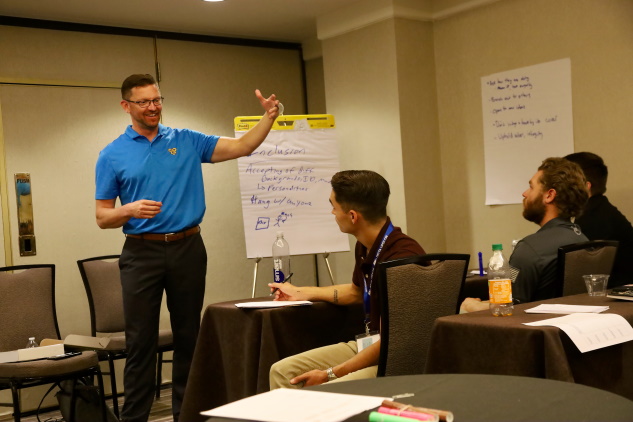Features
Newly-elected President of the Association of Fraternity/Sorority Advisors, Brother Noah Borton (Southern Utah), reflects on his career in fraternity/sorority life and why he’s a passionate advocate for the movement.
 1. You became an initiated member of Sigma Nu at Lambda Iota Chapter (Southern Utah). What about the Fraternity or the collegiate chapter drew you to Sigma Nu?
1. You became an initiated member of Sigma Nu at Lambda Iota Chapter (Southern Utah). What about the Fraternity or the collegiate chapter drew you to Sigma Nu?
I think I have a pretty typical story. As a freshman, I was sitting in Juniper Hall at Southern Utah, looking up transfer applications. I was really struggling to connect, I had some good friends, and there was nothing necessarily wrong, but something was missing. I had yet to find my place on campus. Then, I met a couple guys on my dorm floor, Nick and T-Roy, and they started talking to me about Sigma Nu. I had been pretty involved in community service efforts in high school, and I saw that Sigma Nu gave me a way to get involved with service in college. I appreciated the focus on leadership development. Above all, Sigma Nu was a place where I could feel accepted and supported. That really played out throughout my time in Sigma Nu as both an undergraduate and alumnus. I have had an outstanding experience, and I have been fortunate to be surrounded by brothers who have invested in me to help me find success.
2. You’ve long served the fraternity/sorority movement. You’ve been a staff member for two national headquarters (including Sigma Nu), a campus-based fraternity/sorority advisor, a Division Commander, and most recently, you were elected President of the Association of Fraternity/Sorority Advisors. What motivates you to stay engaged in supporting the movement and advocating for fraternity/sorority experiences?
The bottom line is that I am still involved because I believe in what this experience can provide for our members. The experience our members need, and deserve, does not just happen. We need to invest heavily and work diligently to ensure our members get an experience that fosters their growth, development, and well-being.
Also, I am here because I am still having fun. It is not lost on me that every time I get to sit in a room with a group of undergraduates is a special opportunity. I enjoy this opportunity to work with a group of men to develop their skills and, ultimately, confidence in their abilities to become leaders who will positively impact their communities, workplaces, and families.
3. You currently serve as the Senior Director of Educational Programs for Delta Upsilon International Fraternity. Has working for a men’s organization different from your own affiliation revealed any truths or insights into interfraternalism or the power of fraternity?
I get asked about what it is like to work for another fraternity all the time. I liken it to coaching, perhaps because my wife is a volleyball coach, so there is a lot of coaching talk around our house! I think it is like playing in college at one university, then starting a career in coaching at another institution. There are unique institutional and team cultures, and there are differences in the systems the teams utilize, but ultimately football is football. I apply this to fraternities as well. There are unique organizational cultures and nuances. We might use different words to define our objectives, but ultimately we are all trying to help young men become better versions of themselves so they can positively impact those around them. The fundamental work of fraternity is the same regardless of where you are.
 4. As President of the Association of Fraternity Sorority Advisors, you are a leading voice for advocating for the profession of campus-based and headquarters-based fraternity/sorority staff and the general fraternity/sorority movement. What do you believe is the most critical issue facing fraternities and sororities? How can fraternities and sororities rise to the occasion to address that issue?
4. As President of the Association of Fraternity Sorority Advisors, you are a leading voice for advocating for the profession of campus-based and headquarters-based fraternity/sorority staff and the general fraternity/sorority movement. What do you believe is the most critical issue facing fraternities and sororities? How can fraternities and sororities rise to the occasion to address that issue?
If you look back at the history of fraternities and sororities, we have continually evolved to meet the needs of undergraduate students. The points where we have struggled over time have been because we have failed to adapt or because we have adapted in ways that do not align with the educational objectives of our host institutions.
The biggest challenges we face now are the evolving needs of students coupled with the shifting enrollment patterns and demographics in higher education. As the environment around us changes, we are going to find that the fraternity experience has become less accessible to students due to cost, time demands, housing needs, and misalignment with needs/interests. If we cannot adapt to create more accessible experiences that appeal to a more diverse student population, we will find a difficult future ahead.
Something within this that is inherently challenging for us as alumni is that this could require us to let go of some of what we have known fraternity to be. I need to accept that my experience at Southern Utah University twenty-five years ago might look different from the experience students need today.
5. Tension between headquarters staff, local chapters, and campus administration is nothing new in fraternity/sorority life. What advice do you have for these groups to work collaboratively toward healthier, high-achieving communities?
Conflict and tension have certainly existed among the key entities in the fraternity and sorority environment. There are situations where organizations want to sever the campus relationship and operate independently. There are situations where campuses say fraternities are not worth it and we should just get rid of them all. Then, there are situations where local alumni and chapters say why do we need the campus or the headquarters? In many ways, it is understandable why we end up in these places. While we can certainly get angry at one another and go our separate ways, I do not believe this is the path that is most likely to generate success. Just because we can go our own ways does not mean we should.
Much of the tension and conflict we experience centers around response to student behavioral concerns. Unfortunately, there are bad actors out there. You do see institutions that overreach in ways that violate student rights and due process. You do see organizations that fail to respond to conduct issues. There are alumni who enable destructive behaviors. However, I do not believe this represents the majority. When we frame all our responses and our relationships around the most extreme actors in each camp, then we are not setting ourselves up for success. Framing things in this way creates this idea of sides which inherently becomes adversarial when conflict arises.
Despite the challenges, I believe the dynamic that gives us the greatest chance of success is one where fraternities and sororities are recognized by the institution with a formal relationship, where both institutions and organizations invest in support and accountability systems, and where alumni are engaged. I do not mean to be Pollyanna here, there are challenges. Everyone is going to have a line that cannot be crossed, where the relationship breaks down. This is where we have to challenge each other not to cross those lines. No matter how challenging things get, we need to do everything possible to resist those extreme actions that paint the other entities into a corner where they have no choice but to blow up the relationship. Ultimately, we all need to recognize that we are on the same team, and we need to make that team work.
6. Thinking about the newest fraternity and sorority members, the Class of 2027, what advice would you give a new member about making the most of their experience over the next four years?
I would say to our newest members that it is supposed to be hard. Truly maximizing the impact of the fraternity and sorority experience requires effort. This is challenging work. There will be conflict, there will be failure, and there will be days you do not know what the heck you are doing. In these moments, they need to embrace the opportunity and find the perseverance to work through the difficulty.
7. How can alumni advocate for and support the fraternity/sorority movement?
As I think back on my own experience as an alumnus, something that really stands out is that my relationship to Sigma Nu and what fraternity means in my life has evolved over time. I don’t think it is necessarily more or less important, just different, and the way I connect with the Fraternity has evolved with the changing dynamics of my life as well. I think it is important for alumni to recognize this. Supporting fraternity and sorority life does not have to mean one specific thing. I think all alumni need to look at their relationship to Sigma Nu and find what meaningful engagement and contribution looks like for them in this season of their lives.
For some, this might mean being an engaged advisor coaching our undergraduates. For others, it might be a monthly contribution to the Foundation. Others might find value in a volunteer role with the national organization or a campus work group, while for some, it means posting an encouraging comment on Facebook. The point is finding your place to engage and finding value in what you can offer.
